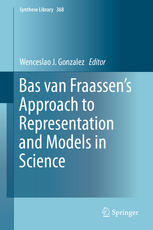

Most ebook files are in PDF format, so you can easily read them using various software such as Foxit Reader or directly on the Google Chrome browser.
Some ebook files are released by publishers in other formats such as .awz, .mobi, .epub, .fb2, etc. You may need to install specific software to read these formats on mobile/PC, such as Calibre.
Please read the tutorial at this link: https://ebookbell.com/faq
We offer FREE conversion to the popular formats you request; however, this may take some time. Therefore, right after payment, please email us, and we will try to provide the service as quickly as possible.
For some exceptional file formats or broken links (if any), please refrain from opening any disputes. Instead, email us first, and we will try to assist within a maximum of 6 hours.
EbookBell Team

5.0
90 reviewsThis book analyzes Bas van Fraassen’s characterization of representation and models in science. In this regard, it presents the philosophical coordinates of his approach and pays attention to his structural empiricism as a framework for his views on scientific representations and models. These are developed here through two new contributions made by van Fraassen. In addition, there are analyses of the relation between models and reality in his approach, where the complexity of this conception is considered in detail. Furthermore, there is an examination of scientific explanation and epistemic values judgments. This volume includes a wealth of bibliographical information on his philosophy and relevant philosophical issues.
Bas van Fraassen is a key figure in contemporary philosophy of science, as the prestigious Hempel Award shows. His views on scientific representation offer new ideas on how it should be characterized, and his conception of models shows a novelty that goes beyond other empiricists’ approaches of recent times. Both aspects — the characterization of scientific representation and the conception of models in science — are part of a deliberate attempt to forge a “structural empiricism,” an alternative to structural realism based on an elaborated version of empiricism.